previous issue. portal. search. recycle. map. next issue.
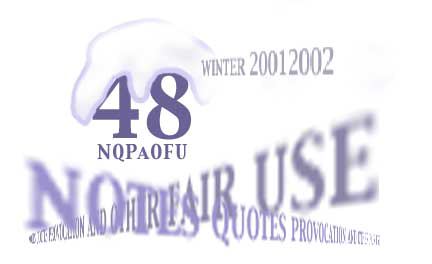
24 November 2001
in lieu of misanthropy
I'm off to the Moulin again for general sanity and uneventful change.
23 November 2001
concentration
Michael Nedo is a trained tool maker, mathematician, experimental physicist and zoologist. Since 1986 he is the editor of the Wiener Ausgabe of Ludwig Wittgenstein's writings and since 1992 director of the Wittgenstein Archive in Cambridge. He was invited to the Jan van Eyck November 21-23 to do three lectures.
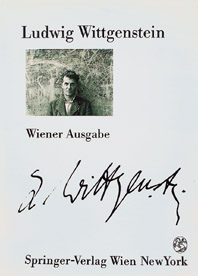
MN reminds us that typography is for readability. It should enhance our concentration on what we are actually offered as a thought, or fiction. Like writing itself, I would say. A certain writing needs a certain typography, while they both serve the same purpose of being able to let us follow a trail of thought. Did I forget. Even if for reasons of being smart and up to data we often like to look at writing instead of through it, or I would suggest 'past it' (past writing and typography, because we know it is there and we could choose to look at it, it is not 'invisible', but neglectable—which is another reading: not of the text but of the typography—but we do not, since we let ourselves be taken away), the pleasure of just reading, instead of a reading/looking (looking past and looking at), is a sublime one. It takes you to another space altogether. Of course for a lot of thoughts expressed such space still exists, but its entrances are overgrown with bad typography.
MN reminds us that type was cut and arranged orderly to guide us to spaces of thought. He reminds us that different editing and printing technologies demand type to be cut, or otherwise constructed, differently, in order to obtain a form which helps typography get us past itself and past the writing, into the space of the thoughts expressed.
MN has not been trained as a philosopher or a typographer. He obtained his remarkable insights by concentration on Wittgenstein's notes and a lot of hard work, to rebuild a body of handwritings and typescripts into printed volumes. He had cut special Baskervilles and wrote and had written his own typesetting software to flow text into print.
The Wiener Ausgabe, in an original large format bound edition, and a reduced size paperback edition at Springer Wien New York, is a case in point for typography, print and the book, as the means of transport to certain spaces of thought. If you care to look at the edition, like we did the past days, it shows typography of complex patterns of thoughts, which consist of multiple layers and contains deeply linked objects within its own space, yet could only be re-accessed in typography, print and the book, for optimal reading, for optimally following Wittgenstein's thought.
what else is true?
Obviously (this) typography, print and the book do not allow certain other ways of acting with or upon Wittgenstein's body of thought, but such are allowed by different media, also Nedo readily admits. For a further exploration of how and by whom and at which result Wittgenstein will and can be studied we will have to resort to these media and ways of communication.
Wittgenstein on line/on the line, by Herbert Hrachovec of the Institut für Philosophie, University of Vienna, contains a critique of Nedo's edition.
Wittgenstein's Nachlass. The Bergen Electronic Edition
The Wittgenstein Portal by The Wittgenstein Archives at the University of Bergen
My propositions are elucidatory in this way: he who understands me finally recognizes them as senseless, when he has climbed out through them, on them, over them. (He must so to speak throw away the ladder, after he has climbed up on it.)
LW quote from: Wittgenstein's Ladder: Poetic Language and the Strangeness of the Ordinary by wonderful crititc Marjorie Perloff
22 November 2001
'wad' to 'weblog'
On the upload session that preceded IMG SRC yesterday, in Amsterdam I bought Nicoline van der Sijs' just published 'Chronologisch woordenboek; De ouderdom en herkomst van onze woorden en hun betekenissen': a chronological dictionary of the Dutch language. 'Wad' (107 AC) is the oldest Dutch word, 'weblog' (2000) the youngest. The hefty tome is 1164 pages, of which 262 are an alphabetical register, the rest spent on explanatory text. I will certainly quote from it.
weblog digitaal dagboek met korte recensies van bezochte websites
(ref. Ewoud Sanders, 'De taal van het jaar; Nieuwe woorden en uitdrukkingen 2000')
Hm. A 'digital diary with short reviews of visited websites'. Could be somewhat refined. What about the web open source dictionary project? I'll have to check.
Other purchases included the Frieze tenth anniversary issue, if only for its use of gold ink and for its sign o'the times best art charts; Nest 14, including a DJ Spooky CD; Edge December 2001 'pure gaming' issue; Spector cut+paste magazine; finally 'Mined - field' a first issue of a magazine/book (it is presented uncut and without a cover, just 16 32 pages stitched parts) with visual and textual essays on contemporary cultural production. Again, I can only describe what is its look and feel—I still have to open and cut it, to take a proper look. Remember always to use paper to cut paper, a postcard will do perfect. When I was a kid my father used a postcard on the French literary titles which still arrived uncut. This morning, out dropped Levi's Reel Revolution DVD when I took up Mined. Luckily I see no subscription cards or other usual paper waste.
For IMG SRC my fresh purchases served me as a neat material pile on the desk, words and images by the kilos, next to the old school free-standing unrolled movie screen, on which yesterday's NQP and its links were projected. The rap was smooth and didn't allow me to breath for one hour+ when we proceeded to look at some pictures, and maps at cybergeography. I hadn't visited this site since quite some time. It grew at Internet pace and includes a wide variety of 'images', some close to being their terrain. Martin Dodge cum suis have a generous notion of what is a map, including movies and literary works. If you haven't been in their map since a while, go back and look around.
top down material order on desk
Chronologisch woordenboek; De ouderdom en herkomst van onze woorden en hun betekenissen
Mined - field
The Domain of Images
Spector cut+paste
Nest 14
Frieze December 2001
Edge December 2001
20 November 2001
IMG SRC
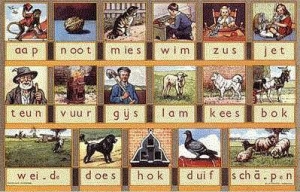
These are my 'IMG SRC' lecture's links. I will address them tomorrow from 2pm CET at the Rietveld Academy, Amsterdam, in the Ovidiuslounge (room 325).
about 58.300 monkey (aap)
about 34.900 walnut (noot)
about 256.000 cat (mies)
about 15.900 wim
about 78.300 sister (zus)
(jet)
(teun)
about 126.000 fire (vuur)
about 19.200 stove (vuur)
(gijs)
about 29.100 lamb (lam)
(kees)
(bok)
about 34.900 meadow (weide)
(does)
about 23.500 shed (hok)
about 12.800 birdhouse (hok)
about 24.700 pigeon (duif)
about 45.100 sheep (schapen)
(AltaVista image search)
learn
Learn to look or learn to read. Learn to learn by looking or reading. Learning to read images or look at text. Learning to see the difference between a text and an image. We all do. Ceci n'est pas une langue. If we could not trust an image/word continuum of some kind, we would never learn. If we could not trust a word/object or image/object continuum of some kind we would never learn. We learn to see a continuum, which will make us learn. We learn to agree on a continuum. This will make us agree. We learn to agree.
disagree
We learn in disagreement. My monkey is different from yours. So is my walnut. So is my cat. YMMV. My house my rules. The 'is of identity' becomes a twist of identity. The twist of luck to be. Twist of luck to disagree.
add
Before we agree or disagree, we want to be able to look at pure growth, abundance. Before we learn to read we want to take in whatever happens. Before there's the organizational fix, the editorial challenge, let's sit back and check this out. I'm certain it is a wholesome thing to do. Marvelling. Let's add, before we start to reduce again.
re: 'against articulation'
the icepick house
omnia mea mecum porto
re:putation
mapping
17 November 2001
looking into the past of my present
The album goes back to 1988, a Feu de St. Jean. There's another Feu de St. Jean, some years later, and two 'Comices', the agricultural flower parades, of 1990 and 1996, with their exotics and comix themes respectively. The scene is Thurigny, St. Germain des Bois, the folks are its folks, 5-13 years younger. Then finally there's this guy that lit the Feu de St. Jean in 1999, not exactly knowing what to wear for a first meeting with the local community. Blank pages for Comices and St. Jeans to come, of which we will be part, follow. The album is only half filled. To see Frank as Captain Haddock on the tractor that pulls the colorful TinTin chariot is one thing, back 6 years. His beard painted black with mascara, smoking a pipe, it's clearly a disguise, a play at which they had a lot of fun. But to see him and Corinne in 1990 comes as a shock. These young kids, just engaged probably, glowing with courtship. Awe. I can't keep my eyes of it. This is the past of our present. We lack this past. We are not in those pictures. We are in our own and in our friends' pictures, in other albums, glowing with the same freshly shaven expectations. But the blank pages we share with these folks, who've come from a different past of the same present.
It makes no sense to publish this photo here. Maybe later, for my own record. For you to experience this strange sensation, you would have to step up to a close yet not lifelong neighbour and ask her to have a look in her family album.
16 November 2001
postponed reaction
Reverse time reasoning. Later. Meanwhile at the Moulin: we witness brilliant clarity and all over crispiness. Matter over mind conditions are up.
foe sharing?
This was queuing from I forgot where (Washington Post/Washtech?):
The Pentagon is taking a friendlier view of Napster's file-sharing concept than are America's big entertainment companies, which have repeatedly sued tech upstarts to stop people from swapping songs, movies and other copyrighted material. Rather than trying to shut down the new computer networks that allow people to directly connect other personal computers, the military wants to enlist their creators in the war against terrorism.
(...) Soldiers need a communication system that will be more nimble and flexible if they are to counter the threat from international terrorists, Wardell said: "You have a dispersed enemy who basically is operating on a peer-to-peer system, at a very low level. How are we going to attack that? Probably the same way."
(...) the military is seeking ways to help soldiers on the ground in places such as Afghanistan get information faster. The idea is to let them establish ad hoc computer connections with forces, say, inside helicopters in Uzbekistan, or with officers back home and even with allies abroad, without getting bogged down in multiple security levels and incompatible software systems."You have to empower the fringes if you are going to... be able to make decisions faster than the bad guy," Wardell said. "You can't do it through the hierarchical systems. It just takes too long."
the good, the bad and the opportunistic
(...) But he acknowledged change comes slowly in the military, especially since many ranking commanders aren't familiar with the fast-changing information technology in the private sector. "For us it is a massive culture shock," Wardell concluded. "That's why we are here asking you to help."
14 November 2001
my house my rules
At 7:30am I can tell somebody lit a cigarette somewhere in the house.
Every time I think of lemoulindumerle.com, or when all of a sudden the genius of the Moulin du Merle locus hits me where I live, I regret the state of its web site. Such a wonderful idea in so much neglect. I bet everyone has one or two of these best projects that never start, or pretend dead.
13 November 2001
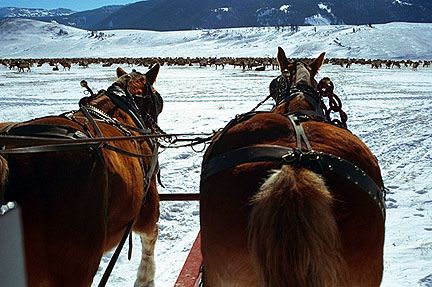
horse-drawn sleigh approaching elk herd
(culture is our nature) (unfinished)
I quoted Hakim Bey's TAZ 'culture is our nature' first on 2 august 1993, in an email conversation with Paul, which I find in the Alamut past, under FOOD CHAIN III. We used to have these intuitive ad hoc back forth long email exchanges when we were working on the Temporary Autonomous Zoo. I searched back the quote this morning. And I'm looking forward to his show in Groningen.
design as comfortable commodity
In sharp contrast to the ongoing history of existential crises which characterizes modern art since we recognize it as such, from mid 19C—including any imaginable technical, conceptual, institutional and representational deep reorientation and inherent formal revolution—design has been as comfortable as any consumer commodity, nested in its usability. Hence in an age of idiosyncratic information exchange, design is in no league for complex and complicit content performance, but sleeps in retro-intelligent mass media mode. But then again, are we as idiosyncratic as we'd wish for? Or is this wish as unrealistic as the one for the 'noble amateur'?
Traditionally technologically fit, design is content challenged anyway. Having emerged front stage with mass media, living from one economical or technological stimulus to another, rallying with consumption and the entertainment industry, it has known none of the existential changes fine arts have struggled for over 150 years.
Symbolism Impressionism Art Nouveau Fauvism Cubism Futurism DaDa Expressionism De Stijl Constuctivism Bauhaus Surrealism Abstract Expressionism Color-field Painting Situationism Pop Art Hard Edge Painting Action/Actionism Fluxus Zero Happening Op Art Photo-realism Arte Povera Earth Art New Realism Conceptual Art Narrative Art Video Art Artist' Books Body Art Light and Space Art Feminist Art Performance Art Installation Art Media Art Graffiti Art Neo-Expressionism TransAvantGarde Appropriation East Village Art Neo-Geo + all international retro and/or post art (non)-isms since
Art's natural urge for cultural exploration gained it its splendid position, outside the realm of use. Under ever changing epistemological conditions art re:examined the pictorial plane, material space and narrative structure.
autonomadic drift
One possible personal artist genealogy would map eg. like:
Odilon Redon Claude Monet Aubrey Beardsley (Fauvism) George Braque Theo van Doesburg/I. K. Bonset, Kurt Schwitters Henri Matisse Piet Mondriaan El Lissitzky Hans Arp Man Ray, Joan Miro, Marcel Duchamp Jackson Pollock (Color-field Painting) Guy Debord Patrick Caulfield, Andy Warhol (Hard Edge Painting) (Action/Actionism) Josef Beuys Yves Klein Jean Tinguely (Op Art) (Photo-realism) Luciano Fabro Remy Zaugg Earth Art (New Realism) John Baldesari Nam Jun Paik Tadinoro Yokoo Chris Burden Dan Flavin Annette Messager Ulay and Abramowicz Bruce Naumann Jeff Koons (Graffiti Art) Mülheimer Freiheit Sandro Chia(?) Sherry Levine Ashley Bickerton Peter Halley, Helmut Federle (more)
'Then': aren't timelines wasteful?
R+r+J played a lot of Exile.
12 November 2001
personal transport
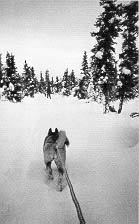
again looking into: animal-powered personal transport, or hybrid animal/human powered personal transport.
Which made me wonder about where's Dean Kamen's Ginger, aka. IT, today?
10-11 November 2001
Happiness and beauty are in the fostering of balance: between fear and hope, certainly, experience and reflection, consumption and production, anger and love, self and other, poverty and richness, between past, presence and future; always finishing and (re-)beginning everything, in one process of whatever change. Why does this sound utterly banal? Because there are two ways of reading it. (-Only 2? -Well yes, only 2. Ain't that a relief?) One as 'slogan', the other one as 'discipline'. Naming the slogan a slogan looks like a smart move but only doubles its dumbing effect. We know, we know by now, we know we know too. So let's forget about it and return to the business of discipline. Uhuh.
Discipline: a true rarity. The most painful would be (self) discipline read as slogan, or strategy—and of course, the other way around: the one reading that spoiled all readings to start with, the rallying sloganization of faith and conviction, and disciplines that followed from these virtues, seeing all men fall through ('zie de mannen vallen'), the dumbing down by way of cliché, the entertaining sound bite, the politics of de-cadence, a free for all fall, la politique du pire (Virilio).
(can you tell I watched television last night? I did)
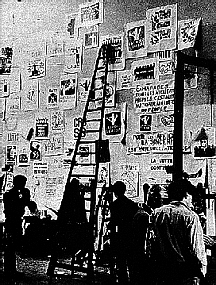
post me a river
discretion
There's no absolutes. First come observations, follow principles. That's how things go after abstinence. Yesterday I wrote about erratic attention when one returns blog. The habit is gone. The balance tipped over to work and world for too long. Today already after having shed the electric prunes and dressfest and the like, I wake up to another mood. I start to remember what I did over the past weeks, where I went, what I said, who I met. Then I start to combine the pieces and look for their connections and come up with the idea of balance. Not too surprising, but it helps me get back on track. Slowly.
self is a crowd
We are smart to embed criticality in un-sloganizing, at the risk of losing the entire project with its more explicit manifestation. An eye for an eye also blinded the visionary eye that spoke in hyperboles for the hell of it. Dog eat dog kills the seeing eye dog. Even if some of us successfully nest the message in a medium, are we/who is able to 'read' it from there? If the author is a first reader, is s/he only answerable to herself? Self crowd?
9 November 2001
Erratic reconnecting to scenes left too long behind.
Weeks pass by without playing a record, or wandering god's own attic,
or delving those piles of books that didn't amass for no reason.
Weeks passed without a word.
home alone
I promise not to bore you too much with my travel scheme this time. Last night I sped home through Ardennen snow, after another jump to NL. First I didn't notice what caused an odd impression. Like you can be mistaken when some guy shaved off his moustache while you're sure he upgraded his glasses. It was getting dark and I was just settling in deep GOGI mode (while linked over, you can scroll down for 18 November 1999 snow. Huh?), gnashing from the seat next to me, which I uploaded with snacks from the gas station just before leaving NL. I first realised what had been going on when I couldn't read the traffic signs, which were plastered over. Then I noticed the landscape was like all powdered over... Christmas trees with chunks of white in it. I mean, on the 8th of November, in this part of the world...
When I waved goodbye to G. just this morning we had our 5 minutes of white, gently coming down, much to the surprise of little P. It was her first and she jumped up and down with cat's amazement. Which ones to catch and play with? It's getting colder and I'm excited as well. (Snow! While Picabia once noted of wind: 'vent, déraison de la nature', I'm a sucker for snow, snow, snow. Like in this fat Garth Williams' picture in Margaret Wise Brown's little golden book 'The Friendly Book' ('Ik hou zo van...', 'I do love...', in Dutch), with the blue dog (or is it a bear? I was always convinced it was a dog) in the window of the tree-housish chalet, and all kinds of down hill animal activity going on, 'Sneeuw! Daar hou ik van! Koude sneeuw. Dwarrel sneeuw. Witte sneeuw. Zachte sneeuw. Sneeuw vind ik reuze fijn! Sneeuw die neervalt zonder geluid. Wit in de blauwe nacht. Wit op de daken. Wit op de boomtakken. Wit op de heuvels. En overal is het héél stil. Sneeuw! Daar hou ik van.')
dress code
The noblog everyday is lived nevertheless. By god knows what kind of swings of fate and planned dérive and usual concoctions. Here I find myself barely recovered from whatever happens, with serious parenting ahead for the next 5 days, Gill off to NL to join her friends for the annual RobeswapdressFest. She took my chest size before she left. Wonder what that'll bring me next Wednesday... some petite robe noir I would hope for. Although these gatherings are meant to clean up closets, they always end with more coming in than went out. Sometimes even stuff returns that went out last year! But some girls in their party must have all the luck of actually emptying out. At least according to my Dressematics.
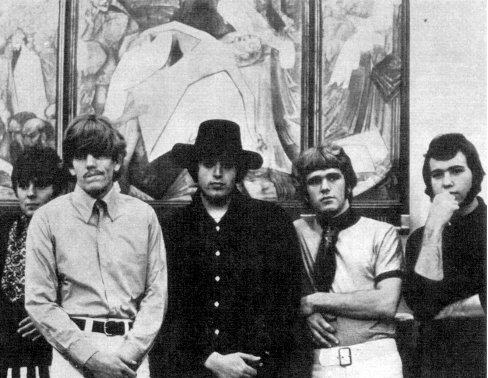
Dr. Do-Good
Like the Monkees on LSD, that's how they sound after all this time. Now playing the Electric Prunes '(travel up to the) Underground' album I remember I bought it at the Leiden Vroom en Dreesman in 1967, while all my money was usually vinyl-bound at Caminada in Den Haag. Love that Dr. Do-Good tune, with its '...doc-tor do goood... is here!' cheer. At the time I was more intoxicated by Long Day's Flight, 'one of their best psych-garage tracks', and I Happen to Love You. Since there's <anysixtiesbandnamehere>.com or net, it needs zero search to track them. But excuse me! They just released a new album on October 31, CD, 'Artifact'. The cover looks just like what you might expect from misunderstanding the early 21C. Wonder what the music's like. Better artwork in the past (allow time to load, scroll down). Such stuff graphic design was made off when I got interested in the field. The High Art of the Rock Poster.
2 November 2001
calculated risks
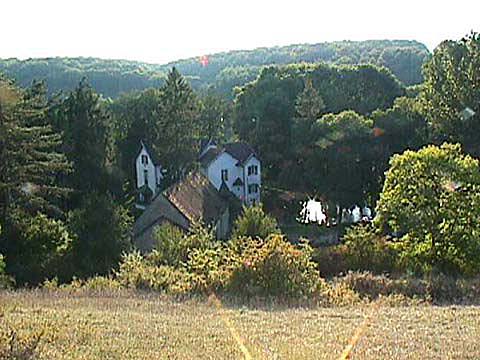
(zero intervention data) Le Moulin du Merle, from the opposite hill, on a last late summer afternoon
Why do I leave this place over and again? Certainly to return to it. Otherwise I wouldn't know. Tonight I lapfrogged the NQP machine up to the bedroom where I lit this fall's first fire and a couple of candles. 'When you're growing up in a small town'... Lou Reed whines from the iTunes jukebox. Earlier today R suggested once more to sell this place and return to Amsterdam to live in the old loft on the Entrepotdok, closer to school and closer to his friends. It always makes me feel sorry when I hear this. He doesn't repeat it as often as before but it apparently is a recurring thought. How to deal with it? He particularly thinks low of his classmates. They are too childish. While there's only 6 or 7 of them in total. Luckily he has Baptiste, who is a year older but in the same room with R's class. They like football and board games. They're both serious in the same childish way, breaking out of it all the time being totally silly. And both take Roemer serious.
It seems like R's relationship to his classmates has got even more distant since he witnessed me shout at three of them, in the car when we returned from class. He felt embarrassed, not because of me but because of them as he insisted on a whispering tone to tell their parents that they misbehaved, which I didn't. It was the first time I raised my voice to them. But French style parenting (hit and spoil) doesn't come natural to me.

(zero declaration data) Concordia University, Montréal, 25-29 October 2001
nqpaofu.com 2001 jouke kleerebezem Notes Quotes Provocations and Other Fair Use